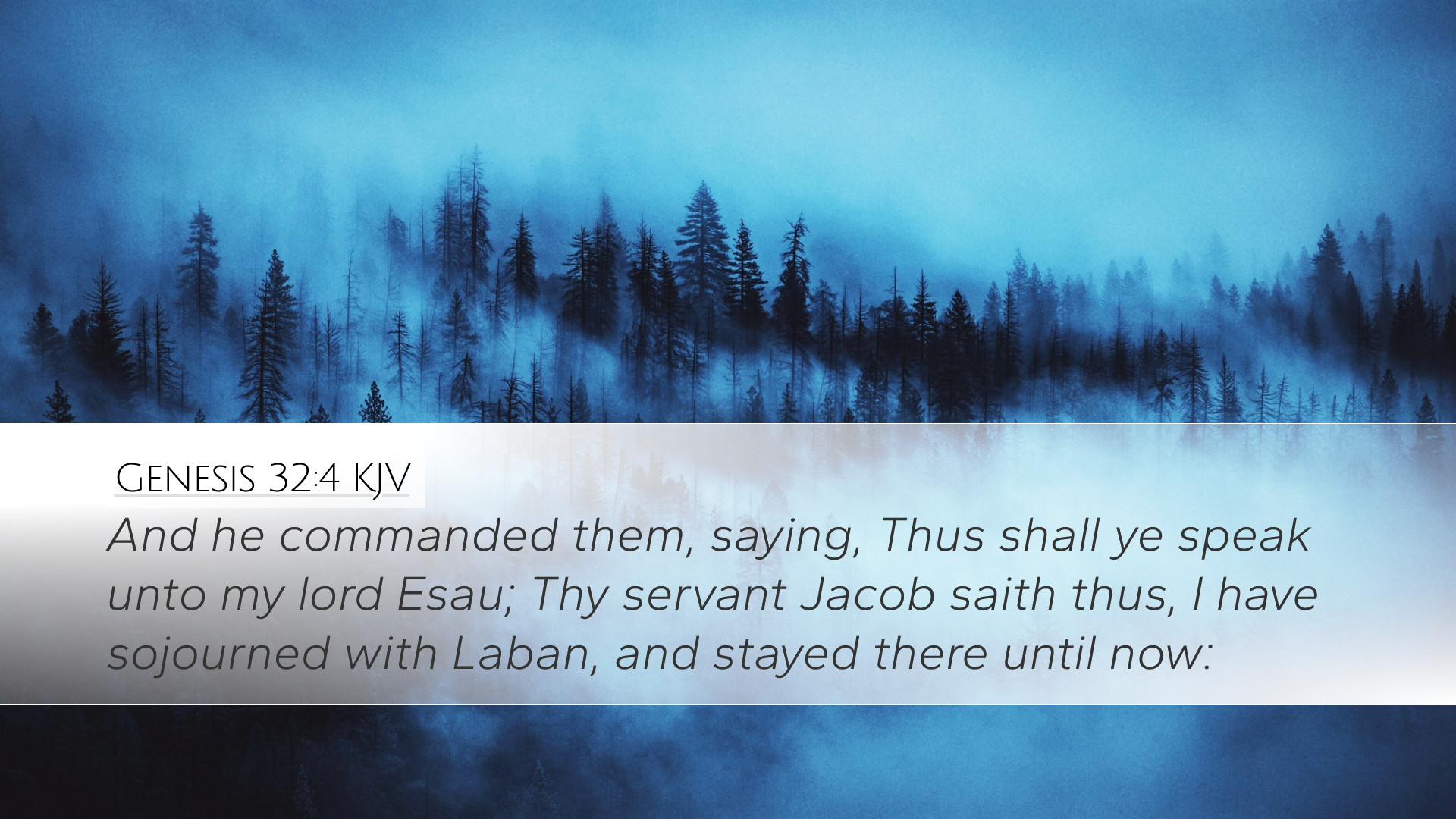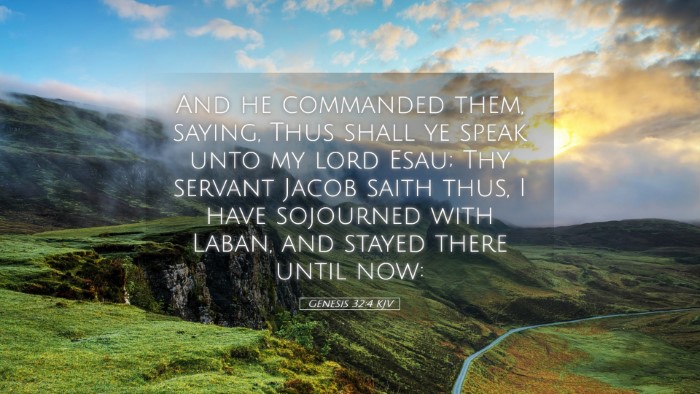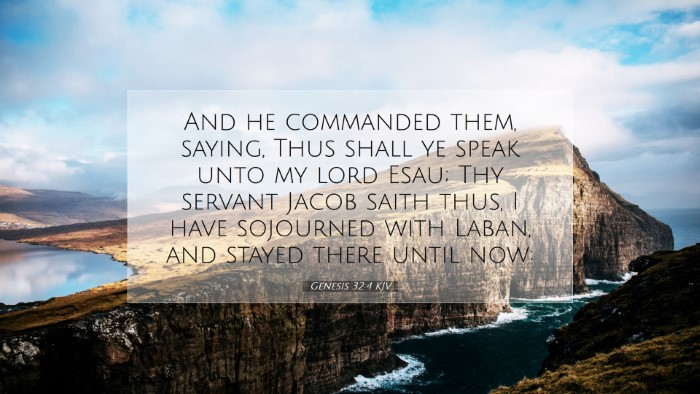Commentary on Genesis 32:4
Verse Text: “And he commanded them, saying, Thus shall ye speak unto my lord Esau; Thy servant Jacob saith thus, I have dwelt with Laban, and stayed there until now:” (Genesis 32:4)
Introduction
This verse is embedded in a pivotal moment of reconciliation and strategy as Jacob prepares to meet his estranged brother, Esau. After years of separation and past grievances, Jacob's encounter with Esau is rife with tension and anticipation. This commentary aims to unravel the theological insights and practical implications of this verse, drawing from public domain commentaries.
Contextual Background
The narrative of Jacob and Esau is central to the theme of conflict and reconciliation in Scripture. Jacob, having tricked Esau out of his birthright and blessing, fled to Laban. After so many years, Jacob's return to Canaan brings him face-to-face with the brother he wronged. This moment occurs in the broader narrative of God's promises and Jacob's growth both as a person and as the patriarch of Israel.
Analysis of the Text
Jacob’s Strategy
In this verse, we see Jacob’s attempt to soften Esau’s heart before their encounter. He instructs his messengers on how to address Esau, acknowledging him as “my lord” and presenting himself as “Thy servant Jacob.” This is a significant shift in Jacob’s approach, indicating a humble posture he has made after years of reflection during his time with Laban.
- Humility: Jacob’s choice to address Esau in submission indicates a transformation in his character, displaying humility and recognition of Esau’s status. Albert Barnes remarks on this display of respect, highlighting how it signifies Jacob's desire for reconciliation.
- Awareness of Past Offenses: The acknowledgment of the past wrongs not only serves to remember the grievances but also illustrates Jacob's understanding of the gravity of his prior actions. Adam Clarke reflects on Jacob’s internal conflict, knowing he must seek forgiveness.
The Role of Communication
Jacob’s instructions emphasize the importance of communication in resolving conflicts. The specific language and structure of the message are significant: “Thus shall ye speak unto my lord Esau”. This thoughtful preparation in communication highlights the necessity of tact in addressing those we have wronged.
- Purposeful Messaging: Matthew Henry notes that messaging employed by Jacob is intentional and strategic, aiming to dissipate anger and build bridges.
- Fostering Peace: The act of sending gifts ahead of his arrival to appease Esau mirrors practical steps believers take towards peace-making in personal relationships.
Theological Reflections
Divine Providence
Underlying Jacob’s actions is an understanding of God’s providence. Jacob’s journey is met with divine encounters and promises. As he prepares to meet Esau, he does so with a faith that acknowledges God’s hand in the past and future.
- Trust in God: Albert Barnes highlights that Jacob's initiative reflects a principle of trusting God while also taking personal responsibility for rectifying prior wrongs.
- Preparation and Prayer: This episode is after notable prayer, marking Jacob’s dependency on God’s favor for his reconciliation efforts, exemplified in Genesis 32:9-12.
The Nature of Family Relations
This moment unveils the painful complexities of family dynamics, a recurring theme in Scripture. Through Jacob’s interactions, the text invites us to engage with our familial relationships thoughtfully and prayerfully.
- Reparation: Jacob’s efforts serve as a model of how individuals can work towards mending broken family ties.
- Reconciliation as Reflection of God’s Grace: The anticipated reconciliation echoes God’s ultimate desire for restoration between humanity and Himself, as discussed by Adam Clarke.
Practical Implications for Believers
Addressing Conflicts
Jacob’s example serves as guidance for believers in addressing personal conflicts:
- Humility in Approach: Approaching others with humility is vital, especially when reconciling strained relationships.
- Strategic Communication: Thoughtfully choosing words can greatly influence conflict resolution, paralleling Jacob's strategic outreach to Esau.
Faith in Uncertain Times
Jacob’s fears regarding Esau mirror the uncertainties believers face today. His actions illuminate the balance between faith and action in uncertain situations.
- Trusting God’s Plan: Encourages believers to proceed with faith while honoring God’s leading, despite their fears.
- The Importance of Prayer: Reflecting on Jacob’s prayer emphasizes the need for divinely guided approaches in efforts toward reconciliation.
Conclusion
Genesis 32:4 provides rich insights into the heart of reconciliation, humility, and the navigation of family dynamics. By studying Jacob's journey, we are encouraged to engage humbly in our relationships, recognizing the importance of effective communication and the overarching providence of God guiding our paths. Such lessons are imperative for pastors, students, theologians, and scholars as they navigate personal and communal conflicts through a biblical lens.


